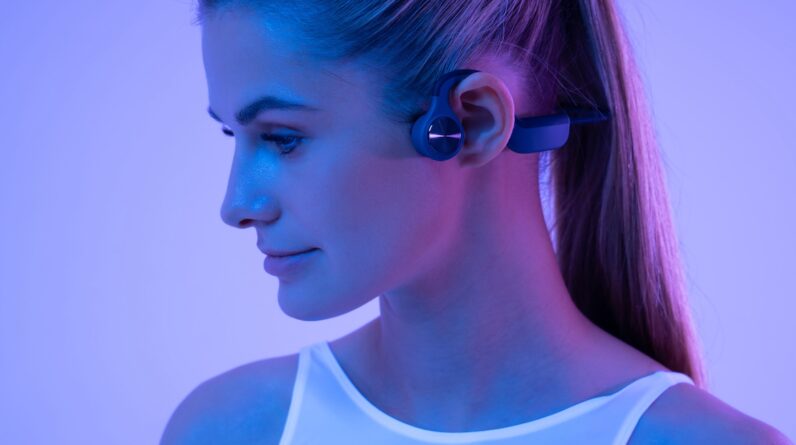
On-ear, open-ear, noise-canceling, earbuds—with so many types of headphones out there, searching for the perfect pair can be a bit daunting. But there’s one type of headphones you may not have even heard of. (Sorry, that pun was just ready and waiting.) We’re talking about bone-conduction headphones, which deliver audio vibrations straight to your inner ear through the bones in your cheek and jaw. Pretty cool, right? To learn more, we spoke with licensed audiologist Ruth Reisman, AuD MBA CCC-A, about what they are and who they benefit. Plus, we rounded up seven of the best bone-conduction headphones to try for yourself.
The best bone conduction headphones, at a glance:
- Best overall: Shokz, OpenMove, $80
- Best sound quality: Shokz, OpenRun, $130
- Most affordable: Vidonn, F1, $50
- Best for swimming: Shokz, OpenSwim, $120
- Best for phone calls: Haylou, PurFree BC01, $120
- Best for workouts: H20 Audio Tri Pro Multi-Sport, $160
- Most unique: Bose, Frames Tempo Sports Sunglasses, $250
What are bone-conduction headphones, anyway?
Unlike traditional headphones, bone-conduction headphones bypass your ear canal and eardrum by sitting on top of your jaw and cheekbone and transmitting sound vibrations directly to your inner ear. They’re attached by a band that fits around your head. “Because all of the bones in the head are connected, when this area is vibrated the signal is transmitted directly to the inner ear,” Reisman says. “The inner ear structures vibrate in tandem with the vibrations of the skull emitted from the headphones.”
The benefits of bone conduction headphones
Folks are becoming increasingly aware of their hearing health, and the overuse of in-ear headphones is one of the main culprits for hearing issues. With that in mind, bone-conduction headphones have some serious perks. Reisman says there are four main benefits:
1. Open-ear design
If you have hearing loss that is caused by abnormalities of the outer or middle ear, but your inner ear still functions normally, bone conduction headphones may benefit you. “The sound will bypass any challenges that the outer or middle ear is experiencing,” explains Reisman. Not only can you moderate the headphone volume and hear music better, but Reisman says bone conduction headphones will also provide a cleaner, crisper, less distorted signal to the inner ear.
Since bone-conduction headphones don’t go inside the ears, they can also eliminate the discomfort associated with in-ear or over-ear headphones. Bone-conduction headphones, by not covering or inserting into the ears, can reduce the likelihood of fatigue during extended use.
2. Fewer ear infections
If you have constant ear infections, Reisman cautions that using traditional in-ear headphones may affect your ear’s healing process. “Keeping the ear open and aerated with bone conduction headphones would avoid further damage to the outer and middle ears,” she says.
3. Increased safety during solo activities
These types of headphones allow for environmental noises to travel through the ear’s traditional pathway, while still allowing you to hear your favorite music, podcasts, and audiobooks. This means you’ll be more aware of the cars or pedestrians around you while biking, running, or walking.
4. Reduced dirt, bacteria, and ear wax impaction
Raise your hand if you’re guilty of not cleaning your headphones enough. Luckily, that’s not an issue with this type of headphones. “Since bone conduction headphones do not go into the ear and are only on the surface, they are easier to clean and reduce the risk of any bacteria or unwanted dirt into the ear,” Reisman says. She also recommends them for people who have significant issues with ear wax impaction, since “this can help avoid pushing the ear wax deeper into the ear.”
7 of the best bone conduction headphones
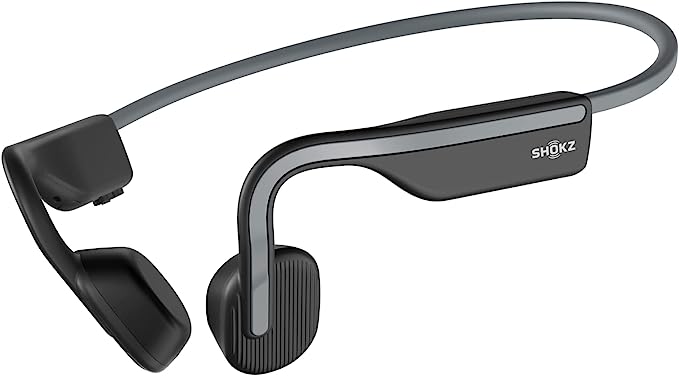
Best overall: Shokz, OpenMove — $80.00
This model was created by Shokz (formerly AfterShokz), one of the most popular bone-conduction headphones brands out there. The entry-level, titanium style is also one of the brand’s most popular styles, thanks to many of its must-have features; they’re sweatproof, lightweight, Bluetooth-compatible, have a decent battery life, a noise-canceling microphone, and even a carrying bag, all at a price point under $100. The secure fit makes them ideal for a variety of low-impact activities, too, from morning jogs and yin yoga to long flights, thanks to the brand’s trademark PremiumPitch™ 2.0 stereo sound.
Colors: 4
Weight: 29g
Water-resistance rating: IP55
Battery life: 6 hours
Music storage: Yes
- Affordable
- Multiple color options
- Bluetooth compatible
- Includes ear plugs
- Sweatproof and water-resistant
- Rechargeable lithium-polymer battery may be less efficient (and, as a result, may lead to a shorter battery life)
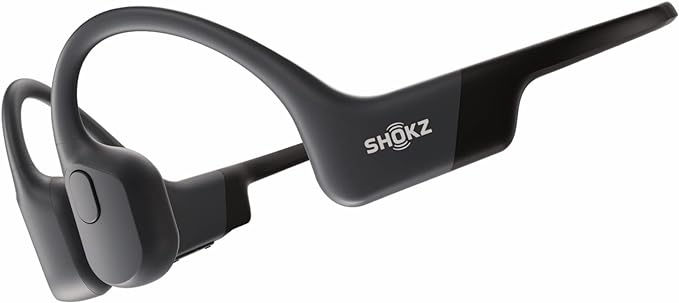
Best sound quality: Shokz, OpenRun — $130.00
Shokz makes a few different titanium headphones, all of which feature excellent sound quality. This is Reisman’s favorite style of bone-conduction headphones for a few different reasons, especially the sound quality—which, as stated previously, can be lacking in other bone-conducting styles. “The sound quality is very clear and consistent,” she says. This is due to the brand’s trademark PremiumPitch™ 2.0+ technology, which delivers a wide dynamic range and rich bass. Reisman also likes that the Bluetooth remains stable and they come with a set of earplugs, “so if you do want to block out the environmental noise and focus on what you’re listening to, you can do so easily,” she says.
Colors: 4
Weight: 26g
Water resistance rating: IP67
Battery life: 8 hours
Music storage: No
- Multiple color options available
- Better battery life than the OpenMove model (above)
- Sweat- and water-resistant
- Very lightweight—the lightest style on this list
- Includes optional ear plugs
- Pricier option
- Buttons are very close together
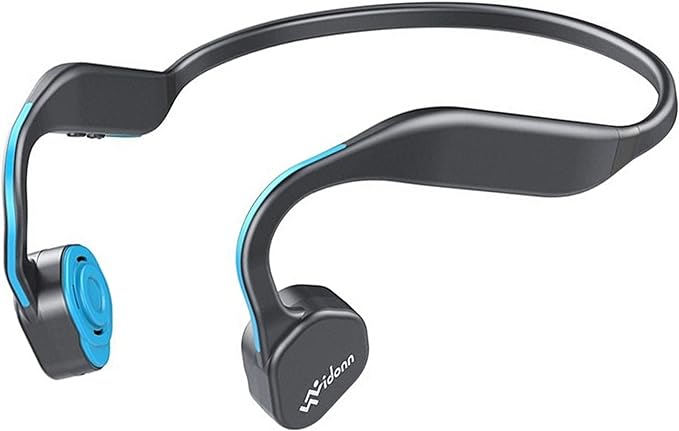
Most affordable: Vidonn, F1 — $50.00
While many bone-conducting headphones can run between $100-$150 (or even more), this Vidonn pair clocks in under $60. Not only is the sweat-resistant style ideal for workouts, but this pair of bone-conduction headphones feature a built-in microphone accessible by side buttons, so you can make (out of breath) calls during your next run.
Colors: 1
Weight: 38g
Water resistance rating: IP55
Battery life: 6 hours
Music storage: No
- Affordable
- Includes optional earplugs
- Sweat-resistant
- Built-in microphone
- Only one color available
- Slightly heavier than other models
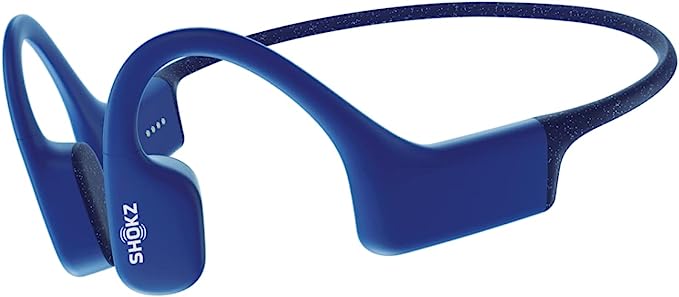
Best for swimming: Shokz, OpenSwim — $120.00
Waterproof headphones with internal storage for a library of up to 1,200 songs? Now we’re listening. This Shokz style supports MP3, WAV, WMA, AAC, and FLAC, so you can jam out while you swim laps. Plus, they fit comfortably under a swim cap and come with earplugs. It’s like Shokz thought of everything! Keep in mind, though, that this style of bone-conduction headphones isn’t Bluetooth compatible, since they would lose connectivity once submerged. Fans of these headphones say they feel like they were designed by swimmers for swimmers.
Colors: 2
Weight: 30g
Water resistance rating: IP68
Battery life: 8 hours
Music storage: Yes
- Waterproof design
- Internal storage for up to 1,200 songs
- Longer battery life
- Not Bluetooth compatible
- Less color options than other models
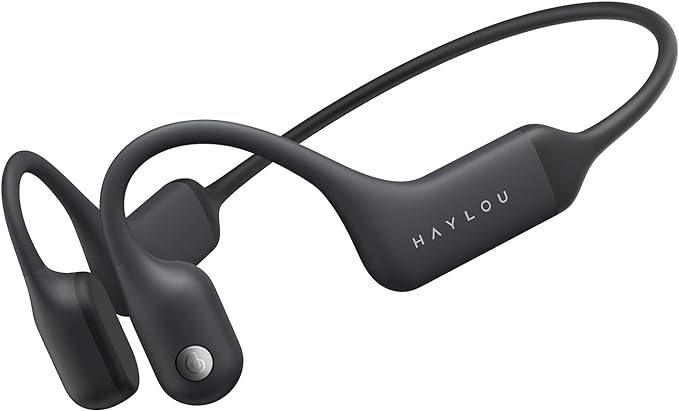
Best for phone calls: Haylou, PurFree BC01 — $120.00
If you’re looking for bone-conduction headphones that offer the typical features, along with the ability to make crystal clear phone calls, this style by Haylou is calling your name. The design has dual-mic noise cancellation to drastically reduce background noise on calls. Plus, the eight-hour battery life can also get a quick re-up from the 10-minute quick charge function, which offers up to two hours of battery life in a pinch. If you love talking on the phone, this is a bone-conducting style worth trying.
Colors: 2
Weight: 28g
Water resistance rating: IP67
Battery life: 8 hours
Music storage: No
- Lightweight
- Sweat-resistant
- Bluetooth compatible
- Dual-mic noise cancellation
- Not the best audio quality for music
- Some customers say the buttons on the top can be tricky
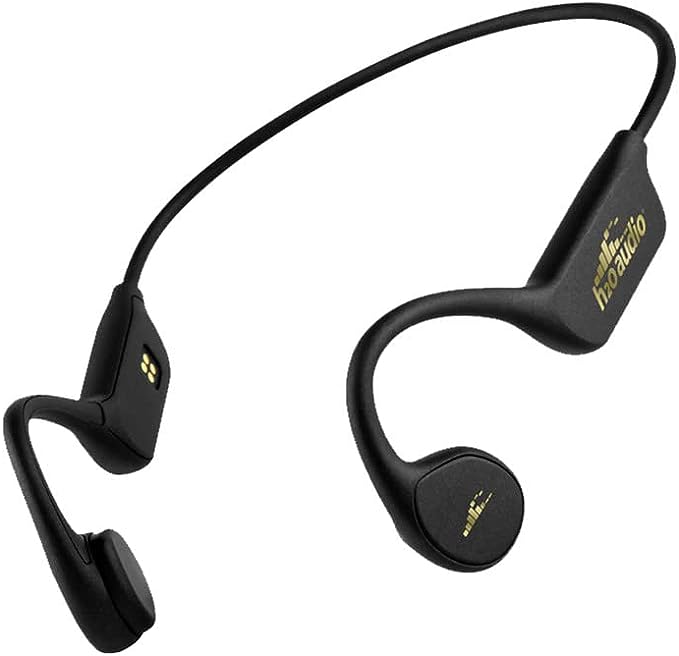
Best for workouts: H20 Audio, Tri Pro Multi-Sport — $160.00
Similar to Shokz OpenSwim, H20 Audio’s Tri Pro Multi Sport bone-conduction headphones offer full waterproof capability up to 12 feet, making them ideal for everything from biking and HIIT workouts to (obviously) swimming. What sets them apart is their extra technical features. Not only are they Bluetooth compatible, but the Playlist+ technology allows you to add up to 8GB of songs—not only from your library, but from Spotify, too.
Colors: 1
Weight: 32g
Water resistance rating: IPX8
Battery life: 5 hours
Music storage: No
- Waterproof
- Bluetooth compatible (although only works a few inches under water)
- Pricier option
- Shorter battery life than other models on this list
- Only one color option
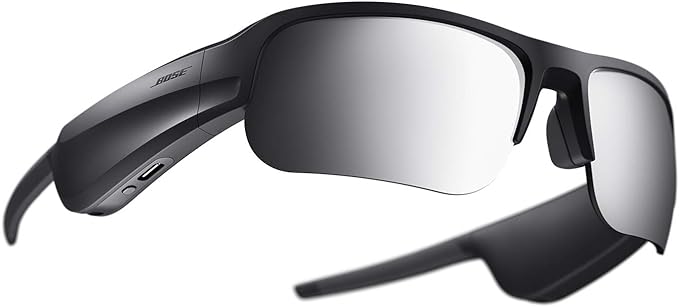
Most unique: Bose, Frames Tempo Sports Sunglasses — $250.00
If you want a pair of open-ear headphones but aren’t necessarily sold on bone-conduction styles, this pair of Bose sunglasses may be just the ticket. Not only does this prescription-ready style feature swappable polarized lenses and Bluetooth capability up to 30 feet, but the mesh lining along the ports makes the design ideal for multi-sport use. The speakers play deep enough to hear over the wind, even while cycling up to speeds of almost 25 miles an hour. They also come with three different sizes of silicone nose pads to ensure the perfect fit.
Colors: 1
Measurement: 65mm-17mm-136mm
Water resistance rating: IPX4
Battery life: 8 hours
Music storage: No
- Interchangeable polarized lenses
- Unique alternative for those who don’t like the typical bone conduction styles
- Excellent sound quality
- Waterproof
- Bluetooth-compatible for up to 30 feet
- Expensive
- Minimal style/color options
Who are bone conduction headphones good for?
Reisman says most people can benefit from using this type of headphones, especially if you have conductive or mixed hearing loss. For people with normal hearing, this type of headphones is ideal because environmental sounds still come through—which is especially beneficial if you want to be aware while walking by yourself at night or on trails.
And, while bone conduction headphones don’t necessarily provide a significant volume increase, the vibrations will be felt more strongly, which can benefit people with significant inner-ear hearing loss.
Frequently asked questions
Do bone conduction headphones sound good?
While it’s nice to have the combination of vibrations and sound, these headphones aren’t perfect. Some people may not prefer them because they don’t create the full range of audio frequencies. Plus, they don’t block out environmental and external noises, so they don’t have the same sound quality as closed-back headphones.
How to choose the best bone conduction headphones for you
When it comes to any type of headphones, your lifestyle is the main focus, so you have to consider what you’d use them for. For those who don’t like an in-ear option, these can be ideal for working out, long flights, or even in an office setting (so you don’t have to continually remove your earbuds or headphones whenever someone stops by your desk to chat). There are even waterproof options available if you want to wear them while swimming.







